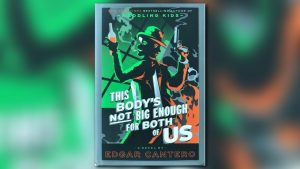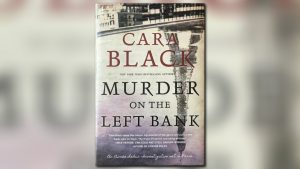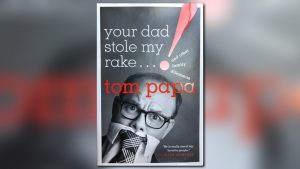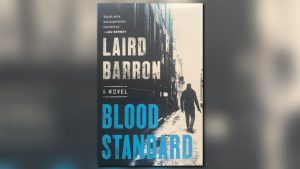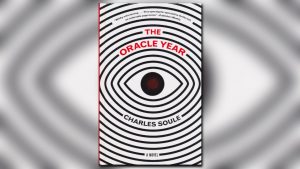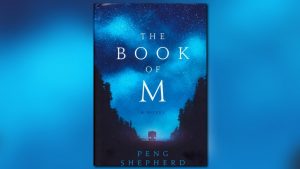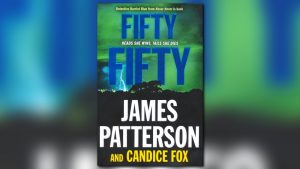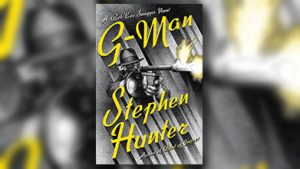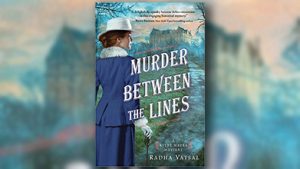Doing Hard Time is twenty-seventh book in the Stone Barrington series and is Stuart Woods’ fifty-third novel.
In need of a break from the bustling streets of New York, Stone takes a trip to California to tend to business and personal affairs.
Just when he thinks he can relax, he finds himself back in the thick of a case he once thought was solved.
Along the path of deception and murder, Stone decides to partner with a highly-skilled man who stays off the grid.
VOICE OVER: And now, an eight original production.
VOICE OVER: "Books & Company" is made possible by the Virginia G. piper center for creative writing. Serving writers and readers in the Phoenix metropolitan area, the state of Arizona and the world.
ALBERTO RIOS: Welcome to "Books & Company." I'm your host, Alberto Ríos. Bienvenidos todos. We're joined today by Stuart Woods, New York Times bestselling author of "Doing Hard Time," published by Putnam. Welcome, Stuart.
STUART WOODS: Thank you very much Alberto.
ALBERTO RIOS: This is quite an extraordinary book because it is also an extraordinary series. It's part of something bigger than itself. There's something I think energetic in that. It's a book that can be read by itself most certainly. This is the character Stone Barrington and his particular group. In this book, particular attention to a variously named character Teddy Fay, goes off by many different names. Maybe you could talk a little bit about how we get to this point in the series and what this book is doing.
STUART WOODS: Well, we got to this point of the series because I finished a book and needed to start a new one. I don't have a better excuse than that.
ALBERTO RIOS: You’ve done that many, many times now.
STUART WOODS: There was no master plan. I write in an extemporaneous manner and I begin the book with a scene and I don't know where it's going to lead me until I've written the first chapter and that suggests a second chapter and so on. When I get to about 50 chapters, I stop and try to figure out how I'm going to get out of the corner I've painted myself into and so far, I've always found a way out. That's how this book occurred.
ALBERTO RIOS: You have no particular plotting technique.
STUART WOODS: No, I don't write it down, draw it out. I think the spontaneity probably helps it. And if I don't know where the books is going then the reader's going to have a hard time figuring it out, too, when I got to the end.
ALBERTO RIOS: It becomes in the best sense becomes an act of discovery. We have words like detective, fiction, mystery, thrillers, all of that language, but to get back to the essence of discovery strikes me as a pretty good, fresh approach.
STUART WOODS: Well, I suppose it's one way to do it. In the beginning, I tried writing outlines because I was told that's what publishers wanted so I actually wrote sort of a scenario, and then I learned -- I was supposed to give a publisher five chapters and the synopsis when we were doing a new contract so I would write a synopsis and then throw it away. It always -- it never came out the way the synopsis said and no one ever complained so I figured it must be okay. Now, I don't even bother to give them a synopsis. I give them three or four chapters.
ALBERTO RIOS: --Which would make a lot of sense. This is not a recipe, in other words. And there's something -- we know that there's some books that work that way. And I think what's great about this is you've got -- you've been able to retain the freshness that can sustain a series and you bring it to each book and the genius of what you do in these books is the ability to compel the reader to turn the page and I wonder if you could talk about that a little bit. I think of it as something bigger than casual or you're just reacting to what you've just written. You do this consistently.
STUART WOODS: It's a skill that is invisible to me. I've never earned an honest dime doing anything but writing. I was an advertising writer in my extreme youth and that taught me to be a minimalist and my readers seem to like that I don't spend a lot of time on description. A writer's greatest tool is the mind of his reader. If you can stimulate that and get to think what you want them to think, then that's good. But I'm afraid that I can't give you a lucid explanation of they keep people from moving -- from moving from one chapter to the next. I just do it and I always write for an audience of one, myself, and my theory has always been if I like it, many someone else will like it, too, and so far, it's worked out pretty well.
ALBERTO RIOS: Seems pretty reasonable. You are choosing an interesting -- I'm going to say cast of characters but it's bigger than a cast of characters. It's where those characters are and I don't mean geographically. I mean, they're all at the top of their game. So many of the books that we might read that are thrillers or maybe detective or various genres are somebody who's alcoholic and, you know, struggling or, you know, addicted to something or can't sleep. This is the opposite side of things. Everybody is at the top of what they do.
STUART WOODS: I don't find any great charm in troubled characters. I don't want people to concentrate on their alcoholism or drug addiction when they should be thinking about who might shoot them if they go around the corner. That's just a needless complication as far as I'm concerned and every book with an alcoholic as a character, there's always a point where he nearly becomes -- starts drinking again and perhaps he does and he has a bad week, and then he fights his way back again but I don't really find that kind of struggle something that's pertinent to what I'm writing about.
ALBERTO RIOS: There's a kind of sense that everybody else who feels that way might start to have each other. O'Connor has a great book and it's a great phrase that she has, everything that rises must converge. And you've got the characters who have risen and now have found themselves in some fashion at least socially together. They do these various exploits but they're in some fashion finding themselves together. Now, we've got this main character, Stone Barrington, who's really the character of the series. Maybe not altogether the main character in this particular book. Could you talk a little bit about him?
STUART WOODS: Well, Stone was a New York City lad, raised by a mother who was a painter and a father who was a cabinet maker in the Greenwich Village, he went to the NYU law school and I think the summer before his senior year, he took a ride with the police for a few days in a car and he became enamored with police work. When he finished law school, he didn't even take the bar, he went straight into the police academy and he did that for 14 years before he was -- he might be happier doing something else. And then he had a friend who was a lawyer who suggested to him that a cram course for the bar exam would be a good idea. He did that, got his license, and was hired by his friend's law firm, to be of council, not a partner or an associate, but he was assigned those cases that the law firm would rather not be dealing with themselves, client's wife who had a DUI or a client's son was accused of date rape or something, Stone handled those things and learned to make them go away. And that was the way his law career began but then he expanded and he became more important as an attorney. He still worked out of an office in his home.
ALBERTO RIOS: Various novels that are telling this story in an ongoing fashion. He has kind of a perennial back stage pass it strikes me in terms of all of those different things that they're doing. And along the way he learns or is a pilot and so we have a lot of aeronautics in one fashion or another in the book, in all of the books and maybe you could talk about that interest in flying.
STUART WOODS: Well, I myself fly so I've passed that skill onto him. He has a number of interests that I have, he likes to eat well and he likes to fly and he enjoys travel. But flying is an interesting thing to me and I'm told by many readers that I've made it interesting to them. I don't overwhelm them with technology but people have written to me to say that having flown with Stone from New York to Santa Fe that they at least understand how that happens, how the airplane works, how the air traffic system works and they find that interesting. And I don't make a big thing of it. It just fits into the plot.
ALBERTO RIOS: And along the way you give us some I think terrific phrases. One good example is the title of one of your previous books, severe clear, for example. Could you explain that term?
STUART WOODS: Severe clear is absolutely cloudless sky, visibility unlimited, cabue is another term, but that doesn't say an absence of clouds. But severe clear is when it's so clear you could reach out and almost touch it.
ALBERTO RIOS: Sort of a perfection of thought. It's a wonderful metaphor for something bigger and I loving some across it. I also loved coming across some of the smaller things for which I didn't have any name. I knew they existed. A good example towards the end of this book where the airplane gets chalked.
STUART WOODS: Chalk is just a wedge that goes under the wheel to keep it from rolling when the wind blows. You see that in movies all the time.
ALBERTO RIOS: And you see them putting that wedge.
STUART WOODS: It's called a chalk.
ALBERTO RIOS: It was a great thing. Great to have a name for that and so these things get filled in I think in the reader's imagination. These are visuals that we've seen before, and I think you're helping us to understand some little bits and pieces of it, what you're calling severe clear, for example, just looking out that window for me, I know there's clouds and all that sort of stuff but it's just a great phrase.
STUART WOODS: I lived in San Jose and severe clear quite a lot there. Less so in New York.
ALBERTO RIOS: You've got this other character, too. Stone Barrington is the main guy. But in this particular book now you've got another guy, Teddy Fay, he goes by a number of different names. Could you talk a little bit about him?
STUART WOODS: Teddy Fay was born in a book call Capital Crimes I think and he was a retired CIA employee, not an agent, but he was in charge of the department that equips agents for missions. He supplies them with clothing, weapons, exotic communications devices, but it's the sort of background that has given him a great many different skills. And he can do a lot of things. However teddy has a sociopathic streak, although he has strong moral views. He's not too choosy about how he eliminates those who disagree with him in some fashion. So he began by taking a shot at them. Someone asked me to explain him, I said it's a left wing maniac who keeps killing right wing people which I thought was a refreshing change. But he's not a murderer in his soul, although it's not a very good idea to try to do him harm. He'll probably do you first.
ALBERTO RIOS: Scary thought. I would like to just take a moment to remind our viewers that you've been watching "Books & Company". I'm your host Alberto Rios and we're joined today by Stuart Woods, talking about his newest book, newest Stone Barrington novel, "Doing Hard Time." We've got this character, Teddy Fay, he doesn't do it halfway. When he does it, it's a decision and I have to say it took my breath away on occasion because there's no equivocation, no hesitation, nothing, and I don't know --
STUART WOODS: Teddy is swift.
ALBERTO RIOS He is swift, all right. So we have that. You have also this title, "Doing Hard Time."
STUART WOODS: It was originally going to be called Doing Hard Time in Hollywood. It was meant to be an ironic term, not more about prison but somehow in Hollywood got lobbed off the title page so "Doing Hard Time."
ALBERTO RIOS: I imagined it differently. Teddy Fay is out -- he's having to have this covert existence. And that's what struck me as perhaps the hard time, his invisibility that he had to maintain. And he's got in this book now an invitation to come in from the cold basically. And I wondered if that might not be it. You've got another one.
STUART WOODS: That's a good way of putting it. He has an opportunity and it's difficult for Teddy. He's been his own law for a long time. And to come in and live like an ordinary citizen, although he pretends to do that all the time in his various identities but it's not entirely easy for him.
ALBERTO RIOS: Along with Teddy Fay who appeared in other novels, you make some nods to other things that you've done, other characters, you mentioned Eddie here and you mentioned severe clear. You've got your books talking to each other.
STUART WOODS: That's true, I guess. A little while back my publisher offered me a new contract but he wanted the backs to be called Stone Barrington books but I had all these other characters that I didn't want to abandon so I brought them all into the novels. What he wants is the words Stone Barrington novels to appear on the cover of the books so all the books say that now but there's still Dino and Holly Barker and a number of other characters who have survived one book to the next. Stone only has a few friends but he has many acquaintances.
ALBERTO RIOS: Going back to something when you were talking about it, you're so eloquent about his whole life story, how did you find him? And is he you?
STUART WOODS: I didn't intend to write a series character. I had avoided doing that. My publisher had asked me to. And he said that way your readers will know what to expect from you. And I said the last thing I want them to know is what to expect from me. But I read an article in the New York Times about how cats can fall from great heights and land on concrete and survive. And the way they do that is they assume what's called the flying squirrel position, they spread eagle, offering the greatest part of their anatomy to the wind resistance and that slows down their terminal velocity to about 60 miles an hour. Whereas a human being who fell from a great height and was flailing and screaming would achieve a terminal velocity of 120 miles an hour. And would make a large splat. So I just began thinking, what if a beautiful woman perhaps a famous woman fell, jumped or was assisted from a great height and she had some sky diving experience and she managed to slow down her terminal velocity and she also managed to land in a pile of dirt left there, might she survive? And that was the hinge of this story and I had to invent someone to witness the event and stone Barrington is walking home from the restaurant he and I used to frequent and he witnesses this event and he has to solve the mystery of how it occurred and a number of other things attached to it. So I'll have to thank that article in the times about the cat for giving me the stone Barrington character.
ALBERTO RIOS: There's something humorous. It strikes a chord, it comes out of childhood for me, where you imagine somebody jumping up at the last moment that an elevator is going to hit but you turned it into something and you have great affection for this character as if he's sitting next to you. Have you lived with him that long so he's --
STUART WOODS: Quite a long time now. This is the 28th Stone novel. This is my 55th novel, he's about 50% of my oeuvre now. So I’ve got to know him quite well.
ALBERTO RIOS: This is not the end of the road for this.
STUART WOODS: Oh no.
ALBERTO RIOS: Do you have anything you would like to share in terms of which direction this is going in?
STUART WOODS: I try to make the books as different as I can from each other, although there are some story lines that continue. Certainly the personal history of some of the characters. I try to make the events and the locations as different as possible. I once said that if I got stuck in the middle of the book, I would put my character on a plane and send him somewhere else and that would be good for eight or nine chapters of machine and he could continue the story.
ALBERTO RIOS: That's exactly what I'm trying to get at here. You're so prolific and I'm wondering where that comes from. What is the impetus?
STUART WOODS: I only work an hour a day. I work from 11:00 to 12:00 every morning. During that time, I first answer my e-mail from readers, and then I reread what I wrote the day before and make small adjustments and that sling shots me into the next chapter and I write a chapter and I'm done by noon and I do this seven days a week. And it takes about 60 days to write a book now. I'm doing four a year. And I do that the year round, except for when I'm in New York where I tend to relax. But in key west and Maine, I work double time. But it's only an hour a day. It's the next best thing to being retired and the money's better.
ALBERTO RIOS: Much better.
ALBERTO RIOS: It reminds me of Graham Green. I think he had a similar story, only he did it by word count. 500, I think it was 200 words, maybe 300 a day so that he would stop literally midsentence if he had reached that number and he would have his day and he would come back.
STUART WOODS: I write a chapter in a sitting and that's generally four or five pages. I want that to have a beginning, a middle and an end and it's good for me in that respect, too, and maybe for the reader, as well. I'm very fluent, having written for a living for all my adult life. I don't have any trouble writing down what I want to say. If I know what events are going to occur in the chapter, then I can write them very quickly.
ALBERTO RIOS: Each chapter has to have a beginning, middle and end or something resembling that.
STUART WOODS: That's the way I view it. It's a little story of its own.
ALBERTO RIOS: Which then says that plot's important but it's not the only thing. It's got to make sense at any given point in the story, and I think that's a good way to view it. I think that approach to chapters strikes me as building a house out of some pretty good rooms.
STUART WOODS: Or a brick wall.
ALBERTO RIOS: Maybe, sometimes, it must feel that way I'm sure. That's actually a good question. Would you say that you're in New York and you don't write for that hour a day, you just relax, I wonder if that does feel like relaxation to you.
STUART WOODS: I read a lot, I watch old movies on television which I love and see friends and have a good time. I'm usually only in New York for a few weeks at a time. Two to three weeks at a sit. I'm there three, four months a year and it seems a little less each year. I'm traveling more than I used to.
ALBERTO RIOS: I would be remiss if I didn't ask you about the rhyme between Stone Barrington, wife who passed away.
STUART WOODS: He was introduced to a woman named Arrington Johnson at a party and her first words to him were we must never marry. But they did eventually.
ALBERTO RIOS: How did you come up with it?
STUART WOODS: It happened in the flow of things and I occurred to me that I named her -- I had known a girl many, many years before whose name was Arrington and I like that and I realized that Arrington Barrington would be funny.
ALBERTO RIOS: It is funny. And it's the kind of funny that stays with you. It's a gentle way to take something from this relationship that I think is working on all cylinders otherwise. This whole idea, though, of all of these books, all those characterize, I of this stuff, I'm wondering what do you imagine that they add up to now?
STUART WOODS: Gosh, I don't know. I wonder, you know. 50 years from now when I'm dead and gone if somebody will stumble across them in a library and read one and want to read some more. That's typically how my readers find it. They go to a yard sale or a used bookstore or a friend loans them a copy or someone leaves it on the seat of the plane next to them and they like the book that they read and they go and look for others and they're surprised to learn that there's so many to keep them occupied and on my website there's a list of all the titles collected by character, the star of each book.
ALBERTO RIOS: Which is very useful. That's a nice way to do it.
STUART WOODS: You can print out the list and take them to the bookstore and buy them all. They're all still in print, too, in paperback. The hard backs are not in print but some places like Amazon still have hardbacks of several titles.
ALBERTO RIOS: What a wonderful recognition then of the act of these books to do exactly what we're imagining they do, which is to keep the reader coming back. That said, you can read one book and no other, and be perfectly happy I think, too. Would you agree?
STUART WOODS: If you want more it's there.
ALBERTO RIOS: Of course.
STUART WOODS: And also half of my work has been stand-alone novels, by entirely different people in different circumstances. There's another string of stories for each of characters. There's half a dozen Holly Barker books, there's two or three Ed Eagle books, there's a family of the Lee family that started in my first novel, and the grandson of that family has gone on and is currently president of the United States, as a matter of fact. In spite of what you may have heard. And nearing the end of his second term now and that's going to play a role in a book that I just finished.
ALBERTO RIOS: You used a very interesting word just now, grandson. In this particular book, we've got the introduction of kids who are starting to create careers for themselves in the group of people who are hanging out together here. Is that where it's going? What happens when we start to entertain the notion that Stone is getting a little older and these kids are coming up?
STUART WOODS: Stone is not getting any older. He's early 40s, he will remain so. He's my only relationship to maintaining youth but you would not think that this will be the sort of thing to offer to a teenager but teenagers have a way of discovering things for themselves and the youngest reader I've ever heard from was 8 and the oldest one when she was 100 years old was still coming to my book signings and she didn't show up one year and I figured she had moved on. My readership is amazingly broad. I hear from truck drivers who listen to them on tape when they're driving. A lot of college professors. One from the head of the history department at Yale. And so they seem to be intelligent enough to appeal to a broad range of smart people.
ALBERTO RIOS: Well, I hope that they keep flying.
STUART WOODS: So do I. I have an airplane to support.
ALBERTO RIOS: Very nice. We've been talking today with Stuart Woods about his latest book, "Doing Hard Time." It's one among many so go buy them all. I'm Alberto Ríos, for "Books & Company," We thank you for joining us today and we hope you'll see us again next time when we bring you another good book. Stuart, thank you.
STUART WOODS: Thank you.
VOICE OVER: "Books & Company" is made possible by the Virginia G. piper center for creative writing, serving writers and readers in the Phoenix metropolitan area, the state of Arizona, and the world.





